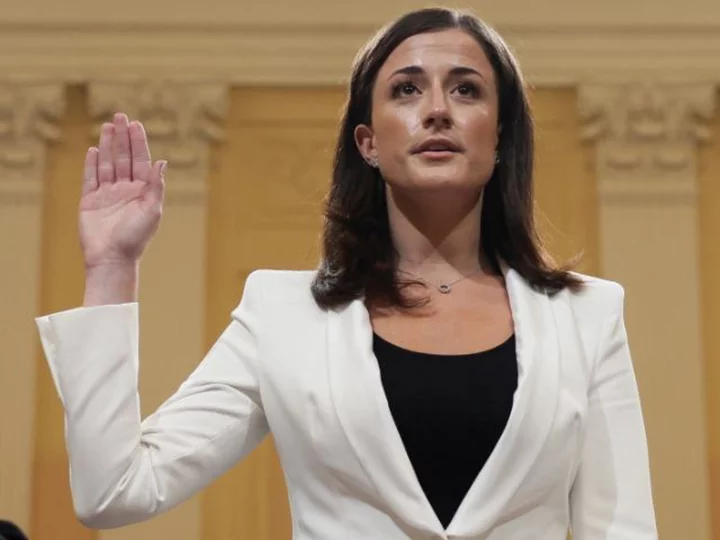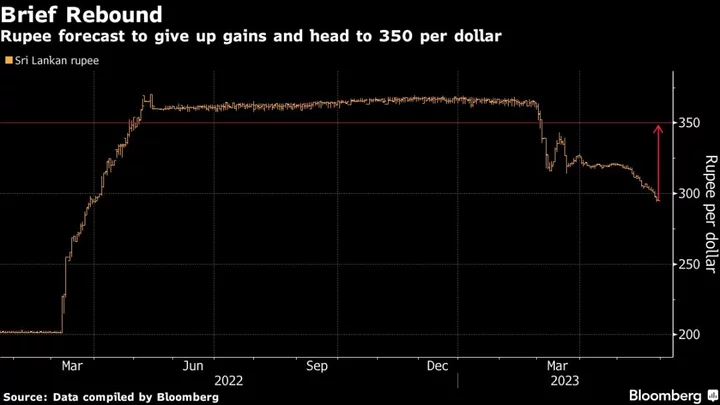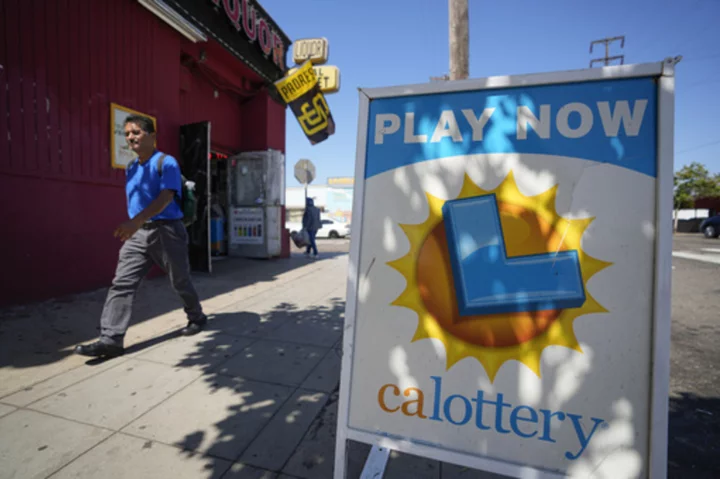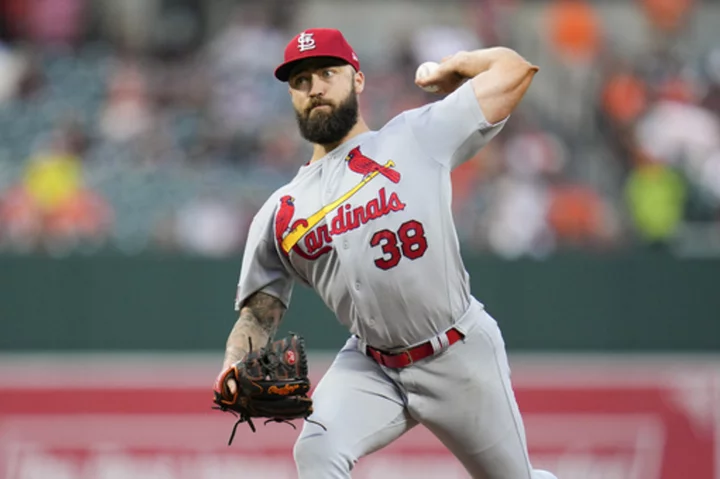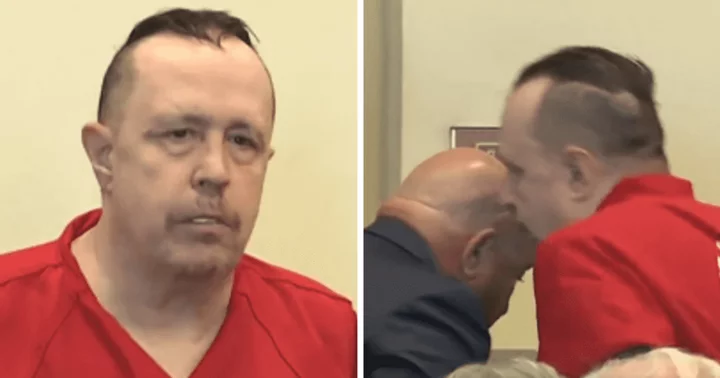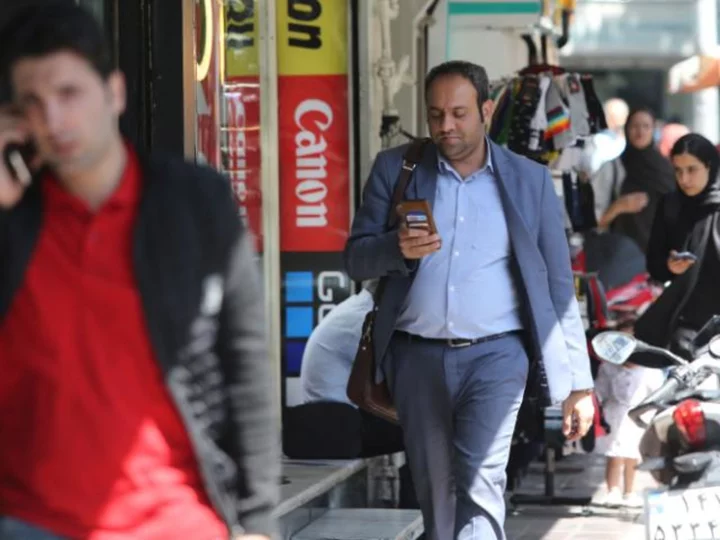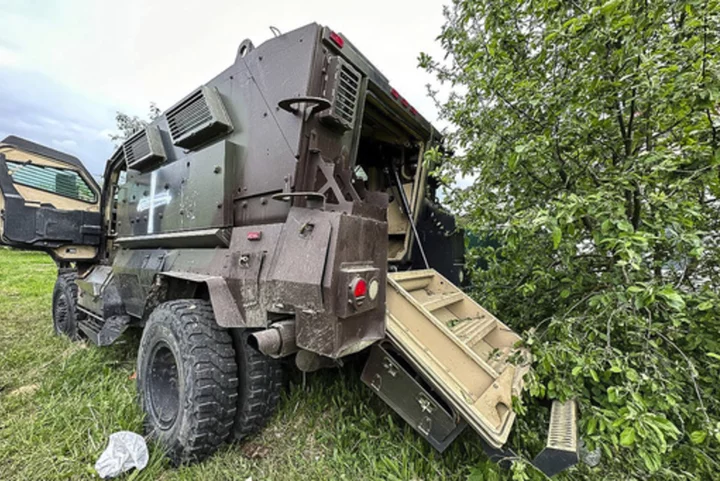In her new book "Enough," former White House aide Cassidy Hutchinson paints the closing days of the Trump White House as even more chaotic and lawless than she previously disclosed in her shocking televised testimony last summer. President Donald Trump lashes out unpredictably and makes wild demands. Chief of staff Mark Meadows leaks classified documents to friendly right-wing media figures and burns documents. Trump lawyer Rudy Giuliani gropes Hutchinson inappropriately the day of the Capitol insurrection.
She also depicts major Republican figures, including Speaker Kevin McCarthy, stating clearly behind the scenes what they refrained from telling the American people: that Joe Biden won the presidential election and Trump lost.
Hints that integrity wasn't exactly the word of the day were there from the beginning, of course. "Cass, if I can get through this job and manage to keep (Trump) out of jail, I'll have done a good job," Meadows told Hutchinson in June 2020.
Hutchinson's book describes her meteoric rise from idealistic Capitol Hill intern at the beginning of the Trump administration to the indispensable aide to the White House chief of staff in the president's final year. Hutchinson, whose testimony before the January 6 committee provided the most damning inside account of Trump's actions -- and lack of action -- on January 6, describes her internal struggle about what transpired at the end of the Trump administration and how she ultimately chose to come forward and testify fully about what she saw in the West Wing.
To hear Hutchinson tell it, the Trump world felt almost like a criminal organization where loyalty was prized above everything. After one 2020 campaign rally, Meadows asked her, "Would you take a bullet for him?" -- meaning Trump.
"Could it be to the leg?" Hutchinson tried to joke back.
Meadows responded that he would "do anything" to get Trump reelected.
After Trump's indoor, mask-free rally in Tulsa, Oklahoma, at the height of the Covid pandemic, attendee and former GOP presidential candidate Herman Cain contracted the virus and died.
"We killed Herman Cain," Meadows told Hutchinson and asked for his wife's phone number.
A spokesman for Meadows disputed Hutchinson's account in a statement to CNN. The spokesperson said it was offensive to suggest this was Meadows' initial reaction to Cain's death. "In the days after he was expressing exasperation that the media would blame the President for Mr. Cain's death. Very different," the spokesperson said.
That did little to change the White House's attitude about masking. In fact, at one visit to an N-95 plant, Hutchinson advised Trump to remove his mask before facing the cameras because his bronzer is smearing on its elastic straps. In another instance in the frenzy after the election, visitors to the White House who tested positive for Covid were admitted regardless because Trump insisted on meeting with them.
These ethical mores or -- or the lack thereof -- were taken to the campaign trail where, Hutchinson writes, Meadows met furtively with former Hunter Biden business associate Tony Bobulinski while being shielded from public view by Secret Service agents.
Hutchinson didn't start truly questioning the men she worked alongside until after the election, but even then, it was late coming. As Trump watched Giuliani's notorious hair-dye-leaking press conference at the Republican National Committee headquarters, he shouted, according to Hutchinson, "Somebody make this stop! Get him off! Make him stop!"
But even then, she says, she "didn't blame the president for any of it yet. I didn't want to blame him. I felt strongly that he should concede the election, and I worried that we were surrounding him with people who fueled his most impulsive behaviors. I knew things could get out of hand, and fast."
'I don't want people to know we lost, Mark'
Meadows emerges in the book as not only duplicitous but as a fall guy for folks who don't want to admit that Trump had lost grip with reality. Director of National Intelligence John Ratcliffe expressed concern about the president's unpredictability, noting that one minute "he acknowledges he lost... Then he'll immediately backpedal."
McCarthy told Hutchinson the same thing. They both blamed Meadows. After the US Supreme Court declined to hear the bizarre lawsuit filed by Texas Attorney General Ken Paxton, full of lies and false claims about the election, Trump pushed Meadows, "Why didn't we make more calls? We needed to do more. ... We can't let this stand."
Trump continued, "I don't want people to know we lost, Mark. This is embarrassing. Figure it out." Even then, when Meadows assured Trump he would work on it, Hutchinson's irritation is with Meadows for giving Trump false hope, not with Trump for demanding that his delusions become reality.
Hutchinson's claim that Trump admitted to Meadows that he lost is the latest in a series of eye-witness accounts of Trump periodically admitting in private to having lost the election. Hutchinson testified to both federal investigators and the Fulton County grand jury, she writes, though she was not referenced in any of the indictments of Trump.
Hutchinson describes a White House that in its final weeks had turned to utter lawlessness, with Meadows regularly burning documents in the fireplace of the chief of staff's office. After Meadows' office became smoky before a meeting, former GOP Rep. Devin Nunes asked Hutchinson, "How often is he burning papers?" When Meadows' wife came to help pack his office in January 2021, she pleaded to Hutchinson, "Mark doesn't need to burn anything else. All of his suits smell like a bonfire."
The Meadows spokesperson said that Hutchinson's telling was an "absurd mischaracterization."
"Mrs. Meadows was referencing how the wood fireplace made the office smell smoky — and we often started it using old newspaper. It had nothing to do with documents," the spokesperson said.
On that wild day of December 18, 2020, when Trump considered proposals in the Oval Office to seize voting machines, White House deputy chief of staff Tony Ornato told Hutchinson he "heard the president talk about the Insurrection Act or martial law," she writes.
Hutchinson writes that at one point during the Oval Office meeting, she heard Trump screaming, "I don't care how you do it just get it fucking done!" It's unclear what the 'it' referred to however.
As senior staffers tried to get Meadows to return to the White House to get the likes of his onetime national security adviser Mike Flynn, former Trump attorney Sidney Powell, and former Overstock CEO Patrick Byrne to leave the Oval Office, White House staff secretary Derek Lyons asked, "Does the chief really need more of a reason to come back? Here it is. Martial law."
Those plans, of course, did not come to fruition, and Trump looked for other avenues to overturn his election loss, pressuring Georgia Secretary of State Brad Raffensperger to "find" 11,870 votes to flip the Peach State from Biden to Trump.
"That call was not good," White House counsel Pat Cipollone told Meadows, according to Hutchinson, who writes that Cipollone was listening in on the call. Testifying under oath to the January 6 committee last year, Cipollone said he had no memory of knowing about the call until he read about it in the press.
In a statement to CNN, a spokesman for Cipollone denied he was on the Georgia call, noting that Cipollone was not among those Meadows introduced at the start of the call.
'I think It's going to go well'
In the weeks after the election, January 6 remained the fail-safe, and Hutchinson writes that Trump visiting Capitol Hill was part of the plan until the very end. "On New Year's Eve, (Meadows) asked me to talk to Tony (Ornato) about a potential motorcade movement to Capitol Hill following the president's rally."
"I think the Sixth is going to go well," Trump said. "Do you think it's going to go well, Chief?"
"Yes, sir," Meadows replied. "I think it's going to go well."
Many of the stories Hutchinson tells about that day were parts of her testimony. Trump knew about the weapons his supporters were carrying -- "Big guy knows," Ornato said, and at this point in the narrative, Hutchinson still found that news reassuring, as if it meant Trump would do something to stop it. She recounts the tell-tale moment at the Ellipse when she heard the president roaring: "Take the fucking mags (metal detectors) down ... Look at all those people in the trees. They want to come in. Let them. Let my people in. Take the fucking mags away. They're not here to hurt me."
Soon after, backstage at the rally, Giuliani slipped his hand up Hutchinson's skirt and up her thigh, Hutchinson alleges in the book. (Giuliani denied her allegation to Newsmax, calling it "absurd.") She stormed away, filled with rage. But it was nothing compared with the rage she later felt after the Capitol was attacked and people died, Hutchinson writes.
As the attack on the Capitol unfolded, Hutchinson said thoughts raced through her mind about what she needed to do -- and she worried it could be the beginning of a coup.
"We have to have a plan in place in case the worst happens. In case this is the beginning of a coup," she writes.
Even this was not enough yet. Hutchinson remained part of Team Trump. Unlike White House communications director Alyssa Farah, who resigned on December 3, 2020, or deputy White House press secretary Sarah Matthews, who left on January 6, 2021, Hutchinson remained.
Part of Hutchinson's rationale was that she saw herself as someone who could help maintain protocols during the final days of the Trump presidency, particularly as Meadows scrambled to get hold of a binder containing highly classified documents related to the FBI's Crossfire Hurricane investigation into Donald Trump's campaign and Russia during the 2016 election.
She was shocked when Meadows gave the classified documents to two right-wing media personalities who regularly toe the MAGA line.
The Meadows spokesman said that Hutchinson's account was false, and that the documents had already been declassified by Trump. The White House counsel's office asked for the documents back, the spokesperson said, because they contained elements of personal information that needed to be redacted.
"It was not an issue of classification -- it was about procedural redactions," the spokesperson said.
Hutchinson, however, writes that Cipollone told her the documents were still full of classified information, and he demanded their return. Before she could leave to call Meadows, Cipollone added: "Hey Cass, while you're on the phone with him, can you tell him we cannot pardon Kimberly Guilfoyle's gynecologist?"
"My jaw was hanging as I turned around to look at Pat. I knew by the look on his face that he was dead serious," she writes.
According to Guilfoyle's testimony to the January 6 committee, she was seeking to help the son of her former gynecologist, a well-respected California doctor.
'We just want to protect the president'
The book is a journey, with Hutchinson judging herself to have been "complicit" in the decisions that led to January 6. After telling the story of her troubled upbringing -- with a largely absent and ultimately abusive father -- Hutchinson's story is mostly about her time working for a president she once "adored."
Initially, Hutchinson says, she was "transfixed" by Trump and how he electrified the crowds at his rallies. Working in the White House, first in the Office of Legislative Affairs and then under Meadows, she focused on her mission of helping the president and being a "loyal foot soldier," she writes.
Numerous examples of Trump's questionable behavior are glossed over as Hutchinson, ever the loyal aide, saw them as normal at the time. That includes Trump's 2019 phone call with Zelensky that ultimately led to his first impeachment and the 2020 Atlantic story about Trump referring to American soldiers killed during World War I as "losers" and "suckers" -- which a former senior administration official with firsthand knowledge confirmed to CNN.
In the summer of 2017, Trump's first year in office, Hutchinson was an intern in Sen. Ted Cruz's office. By 2020, she was dressing down the Texas Republican senator for showing up uninvited to Trump's arrival on a Texas tarmac, warning him that if he didn't leave it would be the "last presidential event you ever receive an invitation to."
Trump loyalists attack Hutchinson to this day as having tried to work for the 45th president in Florida well past January 6, 2021, and Hutchinson fully owns up to that, making clear that her break with the president and his team didn't come until Meadows fully made clear she wouldn't be part of the post-presidency -- a move that didn't happen until her final three days in the White House.
Much of what Trump loyalists throw at her to discredit her -- for instance, her pleading for help in getting a lawyer -- she admits in "Enough."
The House January 6 committee made much of Hutchinson changing lawyers because of suggestions that her first, Stefan Passantino, was encouraging her to be less than truthful under oath. Hutchinson writes that Passantino discouraged her from fully cooperating. "No, no, no. We want to get you in and get you out," he told her.
"We were to downplay my role, he explained, as strictly administrative. I was an assistant, nothing more," she writes. "Stefan never told me to lie to the committee. 'I don't want you to perjure yourself,' he insisted. 'But "I don't recall" isn't perjury.'" At another time he told her, "We just want to protect the president," she writes.
The book also explains one of the mysteries of the January 6 inquiry: With so many uncooperative witnesses, how did the committee know what to ask Hutchinson to get her to disclose her damning testimony while she was still represented by the attorney paid for by Trump world? It turns out, Hutchinson writes, that she coordinated with Farah, who is now a CNN political commentator, telling her everything she knew. Farah spoke with committee vice chair Liz Cheney, who then knew what to ask Hutchinson during the committee's third closed-door deposition with her.
Jobs are dangled and then withdrawn from Hutchinson as she begins to cooperate with the committee. Soon, she is shut out out and then demonized by Trump world. She leaves open the question as to what might have happened historically if Trump and Meadows had trusted her and invited her to Mar-a-Lago.
But Hutchinson's courageous testimony did occur, so perhaps more important to the republic today is the question of how many more witnesses with Trump-world-funded attorneys involved in current prosecutions and investigations are experiencing the same situation.

